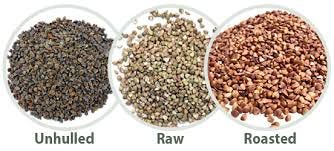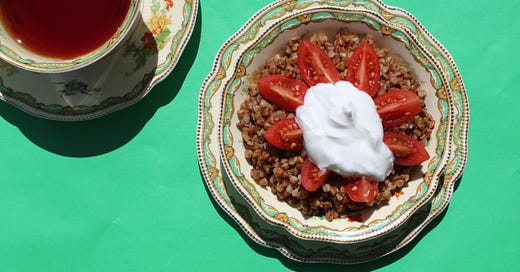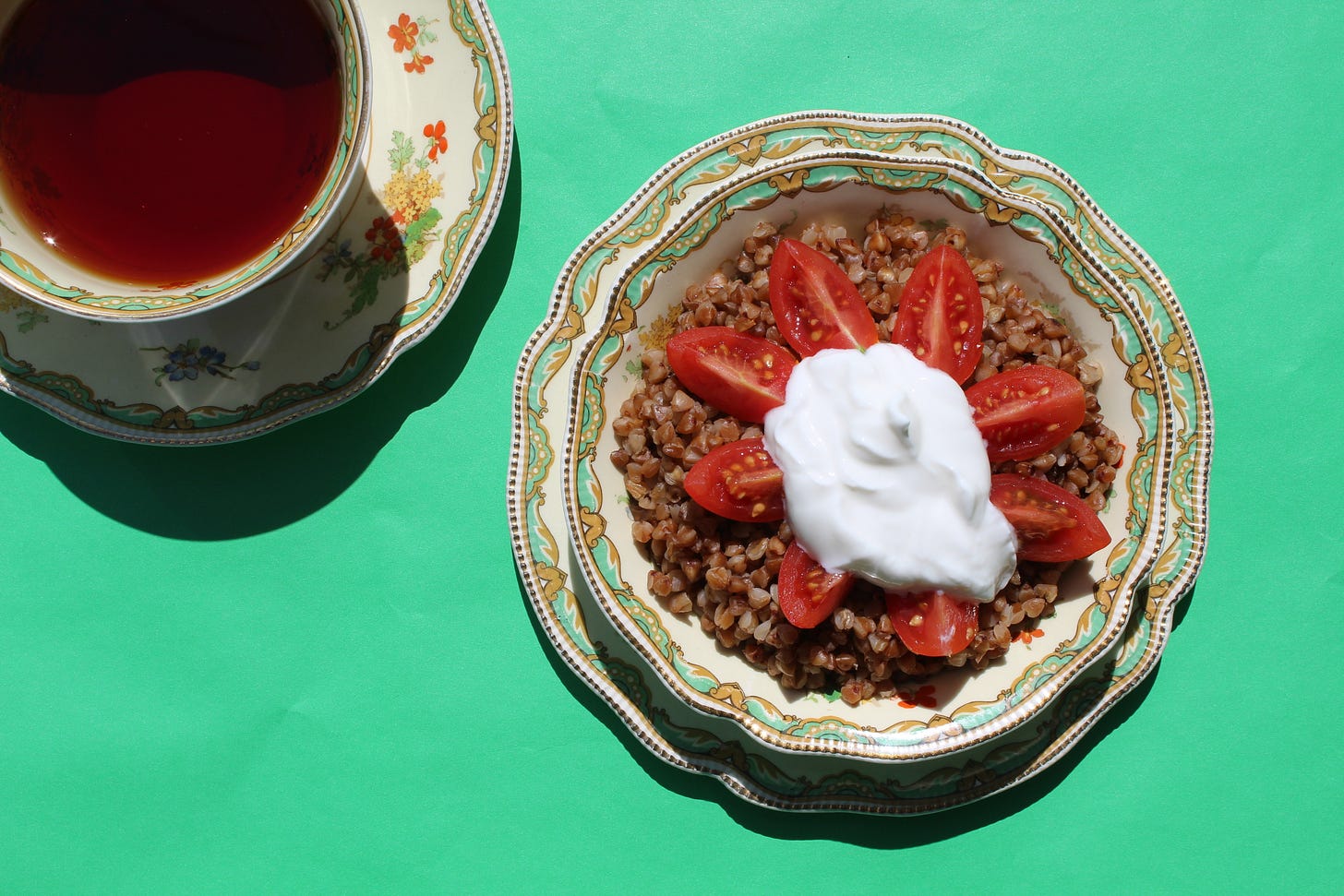finding yourself late to japanese breakfast
and other morning meals to mark your mother's death.
Twenty years into the attention economy, it might seem a foolish attempt to keep up with even the smallest slice of pop culture. Not surprisingly, many of us stop finding new music after the age of 33.
Back in July of 2017, my music algorithm was busy feeding me results for Ukrainian indie-folk crossover bands: 5 Vymir, Panivalkova, the Dakh Daughters and the others built off recommendations from bigger acts like Okean Elzy and Onuka. This left me completely unaware that stateside Michelle Zauner was building steam with her critically acclaimed sophomore album, Soft Sounds from Another Planet, which she performed under the name Japanese Breakfast.
This second album solidified her self-proclaimed brand of “dreamy, shoe-gaze inspired indie pop.” As early as track 2, ‘Road Head,’ we’re hearing a soup that tastes a lot like Karen O and Real Estate. From there ‘Machinist’ and ‘12 Steps’ inject dance worthy beats you might find on a playlist next to M83 into an album otherwise living up to its shoe-gaze aspirations.
The back half of the album is anchored by a three-part distortion-heavy contemplation on love in the face of death starting with ‘The Body is a Blade,’ a return to the more direct references to her mother’s death seen on her 2016 debut Psychopomp. This is followed by an introspective love song to her husband and bandmate that indulges itself by ending with the single word line “thanatophobia” (the fear of dying). I think you get the picture.
Three weeks after the Soft Sounds release, I found out my mom had pancreatic cancer.
It’d take another three years and a pandemic road trip for me to find Zauner’s music and a fourth to discover what we had in common. A breakfast of self-indulgent grief.
If you’re still holding on to summer applications for iced-tea, try Nichelle’s Earl Gray and Limoncello ditty. It’s the athleisure of drinks, sort of fancy but still sweatpants. Or help Tammie decide: is cold brew even good?
In June 2021 the memoir Crying in H Mart chronicles Zauner’s relationship with her mother as she loses her struggle with cancer. The secrets that connected them and how the foods they shared helped solidify a new identity after her mother’s passing.
During her mother’s illness, Zauner tries desperately to learn Korean dishes from extended family members and caretakers. Most try to help, but have been cooking from feel too long to consider documentation useful. In the meantime, many of the family favorites have become indigestible during chemotherapy.
The first welcomed dish is jatjuk, a pureed rice and pine nut porridge, which according to many of the book’s characters is served in Korean homes when loved ones are sick.
When the funeral passes and the search for comfort begins, Zauner becomes immersed in Korean cooking and relies on YouTube chef, Maangchi, for many of her recipes. Nothing satiates Zauner until she finds her way back to a recipe for jatjuk. A mild, private healing that can be folded softly into the day.
In the desperate few months between diagnosis and death, there weren’t many signature Theresa dishes to document. I had long ago mastered my mom’s no bake oatmeal cookie recipe. And although Appalachia has experienced something of a food revival, my mother would have wanted no part in it. So initially I found myself replicating her diet as I remembered it from my childhood, largely filled with chocolate.
At the same time, I found myself newly fixated on Ukrainian cuisine. Language lessons, conversations at work, reading and collecting cookbooks all revolved around tasting and documenting recipes and ingredients from around the country. Like Zauner, I was sorting through a new phase in my identity, one dish at a time.
I started making kimchi once a month, my new therapy. I reserved an older batch for cooking stews, pancakes, and fried rice, and newer batches for side dishes. When I had more than enough to eat, I started pawning it off on friends.
When I did cook, I found myself wanting something private. Leftovers, like me, that would be left alone. In our house, that was a weekly batch of kasha.
Kasha, or roasted buckwheat, is a grain staple in Ukraine. Earthy and aromatic in a way that’s unexpected by what looks like a plain side dish. After noticing it served for breakfast with milk in my school and reading about eating tomatoes on cereal, this combination seemed like it could work to balance the grain’s flavor. In late summer, these were probably also the only ingredients in my fridge. I ate it without pause until the last tomato disappeared from the market. Two months later, my mom disappeared too.
roasted buckwheat with tomatoes & sour cream
Roasted buckwheat comes on strong with a fetid, woodsy taste liable to overpower meeker meats and vegetables. It pairs well with savory egg and vegetable dishes and is frequently served in Ukraine either alone or with a mushroom-onion gravy.

Make sure you have the roasted variety usually found in the kosher, Polish or Russian food section of your supermarket. In the alt-grains section you might find Bob’s Red Mill unroasted buckwheat groats, but those are a bland, mushy second in comparison.
what you need
1 1/2 cups water ◾ 3/4 teaspoon kosher salt ◾ 1 tablespoon unsalted butter ◾ 1 cup roasted buckwheat/kasha ◾ 1 pint cherry tomatoes, halved ◾ 1/4 cup sour cream or plain Greek yogurt
what to do
Bring water, salt and butter to a boil in a medium saucepan with a lid. Add buckwheat, reduce to a simmer, and cover. Simmer for 13-15 minutes. Similar to rice, the hissing will quiet when the grains are done. Remove from heat, letting stand covered for 5 minutes.
Serve with cherry tomatoes and a dollop of sour cream or plain Greek yogurt.
What is your most comforting breakfast?
Reading - Crying in H Mart by Michelle Zauner (2021)
Listening - The Woman that Loves You on Psychopomp by Japanese Breakfast (2016)
Don't you think?
You should try to do as little harm as you can
To the woman that loves youWatching - Pecker by John Waters (1998)
Smelling - My friend’s Nuxe Dry oil Huile Prodigieuse which I stealth sniffed in their bathroom like a total creep. It’s subtle and glorious.







also a late to the game japanese breakfast-listener; wrote her off as interchangeable with any of today's female dreampop stars, but now i can't stop listening to the latest, like a real Old.
more importantly: love how you describe kasha as fetid (100% true, yet alluring), but not as much as i admire this post how you delicately and seamlessly weave death, grief, food.
my most comforting breakfast is cream cheese and jam on toast, a favorite of my mother's long before before it became fancy.
We eat a lot of kasha at home. To boost the protein, after toasting the stuff (if you get the untoasted kind it tastes much better if you toast it before cooking), add an egg or two and cook it so it gets stuck all over the outside of the groats. Then cook it as usual with water or stock and serve with savory toppings. Yumm! Even the kids like it :)